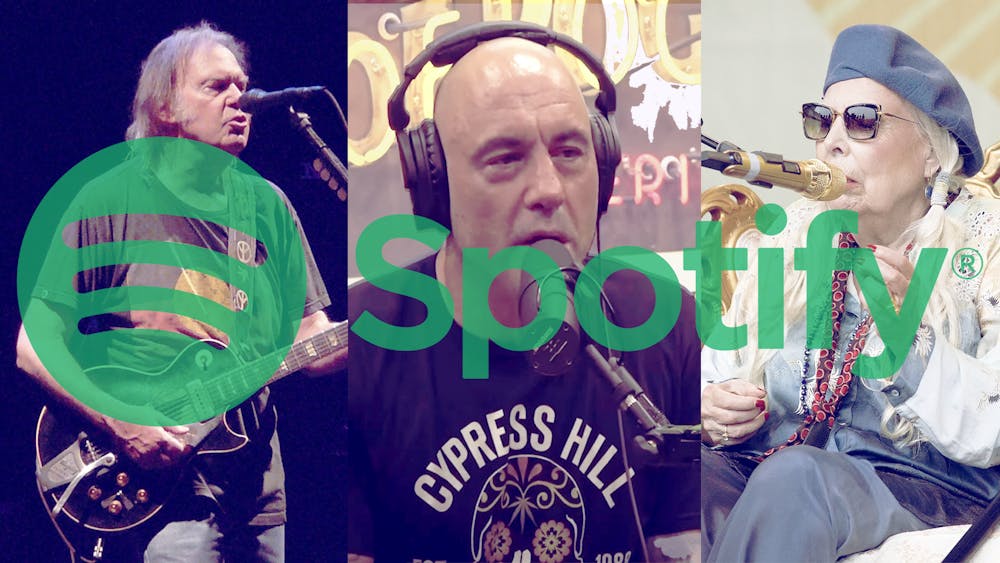Earlier this year, a debacle among the unlikeliest of foes came about when Neil Young gave Spotify a major ultimatum: him or me. Him being Joe Rogan, the epitome of middle–aged man with a beer belly sitting in a basement making a podcast. Rogan’s wide array of guests on the Joe Rogan Experience have included Elon Musk in the blunt rotation of my nightmares, and Robert Malone, an alleged vaccine scientist turned notorious critic of mRNA vaccines. Young threatened that if Spotify continues to allow Rogan a platform, he would remove his discography from the app.
Folk music icon Joni Mitchell jumped to join the fight alongside Young to reject COVID–19 deniers. Mitchell posted “An Open Letter to Spotify” on her website, featuring several scientists and doctors calling on the corporation to create misinformation policies, specifically referring to Rogan and his touting of COVID–19 conspiracies. Mitchell warned she would also pull her music from Spotify, in an act of solidarity with Young and his disapproval of fake news being disseminated on the platform.
Rogan, signing a $100 million contract with Spotify, valuing closer to $200 million, was also responsible for Spotify's $4 billion decrease in stocks immediately after Young and Mitchell’s departure due to Rogan’s spread of misinformation about COVID–19. Spotify chose Rogan over Neil Young, Joni Mitchell, and several other artists.
Music lovers everywhere joined in on the conversation: cries of free speech violations and (self–imposed?) censorship came from JRE zealots. On the other hand, since people who use Spotify are proud of their ability to ostentatiously show off who what when they’re listening to, fans lost some key artists in their arsenal of artists that fueled their music superiority complex.
When Young made his statement to pull his entire music catalog from Spotify, there was an immediate, tangible impact. From January 28 to February 3, Young’s streamed music rose 4%, while his album sales rose 80%. But in Spotify’s quarterly reports, which ended on March 31, the app claimed that premium users increased 15%, to 182 million.
Why did Spotify choose to keep Joe Rogan, a figure with opinions in an auditory medium that is infantile in age and breadth compared to these decade–spanning musical careers? Prior to his departure from Spotify, Young had 6 million monthly listeners, while Rogan continues to rake in the 11 million range. Spotify didn’t remove Rogan, being a multibillion dollar corporation.
Spotify’s Chief Executive Daniel Ek defended the JRE podcast, as it was spearheading 93 markets. Instead of discontinuing support of Rogan through his multimillion dollar deal to combat his use of Ivermectin and racial slurs, Spotify added content advisory disclaimers about COVID–19 all over the JRE podcast page and ironically censored 113 episodes of the podcast.
Spotify chose to keep Rogan, who has since been unseated as Spotify’s most successful podcast. Listeners quickly forgot, as Spotify was hoping they would. Young's former bandmates, David Crosby, Graham Nash, and Stephen Stills pulled their content from Spotify around the time that their former bandmate Young did, but silently returned to the music app in July. When asked why their discography returned to the app, Crosby replied, “I don’t own it now and the people who do are in the business to make money.”
Joni Mitchell and Neil Young have proven their careers aren’t money–driven and are continuing their lives unbothered. Mitchell made her first public performance in two decades on July 24th at the Newport Folk Festival during Brandi Carlile and Friends. Young was to perform in Farm Aid 2022 on September 24, but still felt it would not be best, due to the ongoing pandemic. Meanwhile, yet another call to boycott Spotify arose, as Rogan encouraged people to vote Republican in an August episode, responding to the Democratic Party’s handlings of COVID–19.
How to listen to Joni Mitchell and Neil Young? Perhaps dust off your parents’ Harvest Moon and Blue vinyls, or go to your independent record store and pick up your own copies. Take Young’s advice against supporting Spotify, since “AMAZON, APPLE MUSIC and Qobuz deliver up to 100% of the music today.” “As an unexpected bonus, I sound better everywhere else,” Young says.
Support artists’ endeavors, as they don’t deserve their work being tarnished by corporations like Spoitfy. The next time you hit play on your favorite Spotify mix, remember Mitchell’s qualms with the app: “Irresponsible people are spreading lies that are costing people their lives.”

